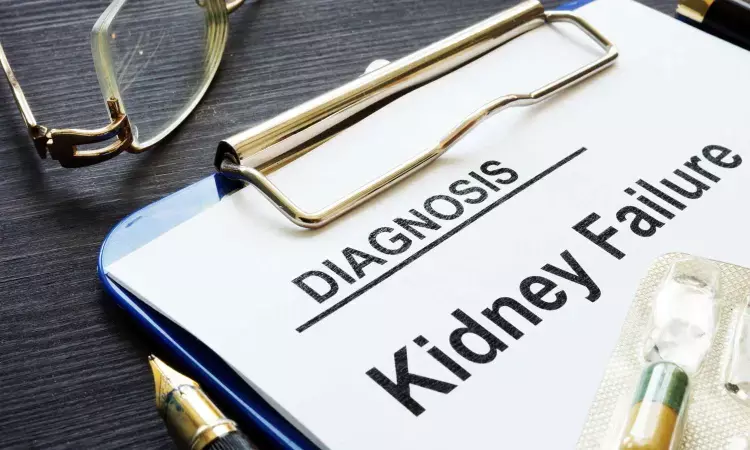- Home
- Medical news & Guidelines
- Anesthesiology
- Cardiology and CTVS
- Critical Care
- Dentistry
- Dermatology
- Diabetes and Endocrinology
- ENT
- Gastroenterology
- Medicine
- Nephrology
- Neurology
- Obstretics-Gynaecology
- Oncology
- Ophthalmology
- Orthopaedics
- Pediatrics-Neonatology
- Psychiatry
- Pulmonology
- Radiology
- Surgery
- Urology
- Laboratory Medicine
- Diet
- Nursing
- Paramedical
- Physiotherapy
- Health news
- Fact Check
- Bone Health Fact Check
- Brain Health Fact Check
- Cancer Related Fact Check
- Child Care Fact Check
- Dental and oral health fact check
- Diabetes and metabolic health fact check
- Diet and Nutrition Fact Check
- Eye and ENT Care Fact Check
- Fitness fact check
- Gut health fact check
- Heart health fact check
- Kidney health fact check
- Medical education fact check
- Men's health fact check
- Respiratory fact check
- Skin and hair care fact check
- Vaccine and Immunization fact check
- Women's health fact check
- AYUSH
- State News
- Andaman and Nicobar Islands
- Andhra Pradesh
- Arunachal Pradesh
- Assam
- Bihar
- Chandigarh
- Chattisgarh
- Dadra and Nagar Haveli
- Daman and Diu
- Delhi
- Goa
- Gujarat
- Haryana
- Himachal Pradesh
- Jammu & Kashmir
- Jharkhand
- Karnataka
- Kerala
- Ladakh
- Lakshadweep
- Madhya Pradesh
- Maharashtra
- Manipur
- Meghalaya
- Mizoram
- Nagaland
- Odisha
- Puducherry
- Punjab
- Rajasthan
- Sikkim
- Tamil Nadu
- Telangana
- Tripura
- Uttar Pradesh
- Uttrakhand
- West Bengal
- Medical Education
- Industry
Aging in the eye predicts risk for kidney failure

Retinal age is a validated biomarker of overall aging. It is defined as the difference between model-based retinal age and chronological age. At an advanced stage of chronic kidney disease (CKD), end stage kidney disease (ESKD) is characterized by severely decreased kidney function.
Researchers have found in a new study that retinal ageing shows efficacy as a potentially important, non-invasive biomarker to predict the risk of end-stage kidney disease (ESKD).
Further among 35,864 United Kingdom residents, every one-year increase in retinal age, assessed by retinal microvasculature changes, was associated with a 10% higher risk of incident kidney failure over 11 years of follow-up.
In the study a deep learning prediction model used to characterize retinal age based on retinal images and chronological age. Cox proportional hazards regression models to investigate the association of retinal age gap with incident end-stage kidney disease (ESKD).
There is a pressing need to identify early predictive biomarkers of kidney failure, given its associated substantial morbidity and mortality. Ageing biomarkers have been associated with kidney failure but their clinical application has been challenging.
In this study recently published in the American Journal of Kidney Diseases (AJKD), retinal age gap (retina-predicted age minus chronological age), a clinically validated and artificial intelligence powered ageing biomarker based on retinal imaging, was associated with the future risk of kidney failure among UK residents.
This non-invasive and ageing biomarker may hold promise to assist in the identification of people at elevated risk for kidney failure.
The researchers concluded that Retinal age gap was significantly associated with incident ESKD and may be a promising non-invasive biomarker for of incident ESKD.
The limitation of the study includes limited generalizability because of the composition of participants in the UK Biobank study.
Reference
Shiran Zhang, Ruiye Chen, Yan Wang, Wenyi Hu, Katerina V. Kiburg, Junyao Zhang, Xiaohong Yang, Honghua Yu, Mingguang He, Wei Wang, Zhuoting Zhu, Published:December 05, 2022DOI: https://doi.org/10.1053/j.ajkd.2022.09.018
Dr Kamal Kant Kohli-MBBS, DTCD- a chest specialist with more than 30 years of practice and a flair for writing clinical articles, Dr Kamal Kant Kohli joined Medical Dialogues as a Chief Editor of Medical News. Besides writing articles, as an editor, he proofreads and verifies all the medical content published on Medical Dialogues including those coming from journals, studies,medical conferences,guidelines etc. Email: drkohli@medicaldialogues.in. Contact no. 011-43720751


